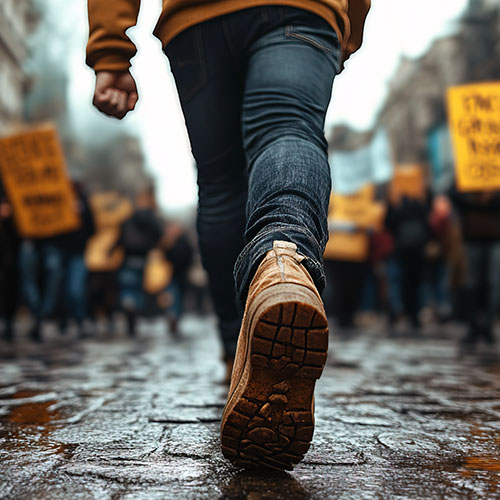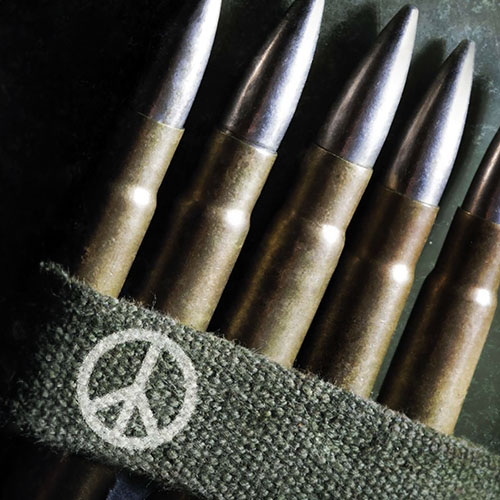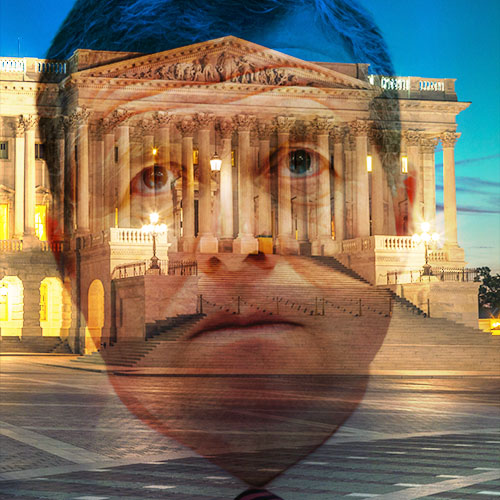The Department of Veterans Affairs Police pledge to protect those who serve — but some argue the agency is one of the least accountable federal forces in America.
Law and Disorder at the Veterans Administration (or Affairs)
America’s obligation to veterans was solidified in the country’s imagination by President Abraham Lincoln, who in the final days of the Civil War called upon Congress to “care for him who shall have borne the battle and for his widow and his orphan.” Two major policies stemmed from Lincoln’s request: standardized pension payments and the establishment of a national network of homes for veterans with disabilities.
The first of these facilities was erected in 1867. Along with providing care to those who’d served, these homes also featured an internal judicial system, one largely intended to keep suffering veterans out of civilian prisons. Much like the outside world, these homes had police officers upholding the rules and jail cells for offenders. This was perhaps the earliest example of hospital policing in America, a trend that has rapidly accelerated in recent years, both in private hospitals and also at facilities run by the Department of Veterans Affairs (VA).
Today, the VA operates a well-armed law enforcement agency of more than 4,000 officers. There are, of course, legitimate reasons to ensure safety inside VA clinics, which often treat military-trained patients with severe psychological issues. The department’s purported values are summed up in its simple motto: “Protecting Those Who Served.”
Yet this maxim doesn’t always match the reality on the ground. For decades, veteran patients have been improperly surveilled, assaulted and criminally charged. VA police themselves are poorly trained and face little oversight. When I investigated them for The Intercept two years ago, I found dozens of troubling stories, including cops disregarding basic police procedures and violating veterans’ constitutional rights.
In the wake of that report, lawmakers and VA officials promised reforms. And yet little has been done. Days after the VA pledged to create new oversight structures, the department’s then-top cop sent an e-mail to officers assuring them that new rules would have “very little to no impact on you, your officers and your operations.” He further promised that oversight would largely remain scant and at the hospital level. “You and your teams do an outstanding job, day in and day out,” he concluded.
In the face of sclerosis, a slew of new horror stories has emerged. At one facility, in Butler, Penn., cops ran training drills with loaded weapons, a stunt that endangered veterans and broke federal rules. In Bay Pines, Fla., an officer used excessive force on a veteran, then authored false arrest affidavits to justify his violence. In Roseburg, Ore., another was credibly accused of placing hidden cameras in the bedroom of a 14-year-old girl.
A number of veteran patients have also been killed by VA cops under dubious circumstances. The most recent incident came in January 2020, when an Army veteran holding a knife was shot 19 times and killed after seeking psychiatric care at a VA facility in Dallas, Texas. A police report said the vet was leaving the hospital when officers chased him down, attempted to disarm him and fired their weapons.
Similarly shocking behavior can be found inside many American police departments. But the VA cops stand out for their reportedly poor hiring practices, incompetent oversight and almost peerless impunity. These conditions collided in the case of José Oliva, a Vietnam veteran and former cop, who in February 2016 was beaten and arrested after seeking dental care at the VA in El Paso, Texas.
During Oliva’s security screening that day, a VA cop allegedly demanded to see his license. Oliva’s lawyers said their client explained to the officer that his ID was in an inspection bin along with his other personal items. This answer seemingly set off the cop, who approached Oliva, then 70, with handcuffs drawn. In a flash, numerous cops tackled Oliva to the floor and beat him. His subsequent charge of disorderly conduct was later dropped.
Oliva enlisted in the U.S. Air Force in April 1965 — one month before his high school graduation. He touched down in Saigon, Vietnam, just before the Tet Offensive, a campaign of savvy surprise attacks against American and allied forces that kicked off the bloodiest year of the war.
During this period, Oliva’s hot and humid jungle base was frequently attacked. Over the course of his deployment, several airmen on base lost their lives. “I remember thinking, ‘If I survive this mess, I need to follow orders, I need to stay safe,’” Oliva told me. “I didn’t want to take any more gambles in life.”
And so he didn’t. After returning safely to America, Oliva kept on the straight and narrow. “I came back to the United States and got a good life for myself,” he explained. “I earned my degree, married my wife, had two little girls.” Oliva also came to appreciate the physical and mental health care he received at the VA.
His beating upended everything. Not only did it result in serious shoulder injuries that required surgery, as well as persistent ear and throat issues, but it also caused deep psychological scars. Oliva became skittish to seek care. For a while, he wore sunglasses and a Vietnam veteran baseball cap to appointments in an attempt to blend in. “After the attack, I was much more careful,” he said. “I tried to avoid encounters with the cops and others on the hospital premises. But sometimes they’d recognize me and stare at me.”
Oliva first sought justice — unsuccessfully — through VA channels. Then he went through the courts, alleging his Fourth Amendment rights against unreasonable searches and seizures were violated by the VA police. His case faced steeps odds, thanks to broad set of legal protections enjoyed by federal officials known as “qualified immunity.”
Predictably, the officers who’d beat Oliva invoked these rights at trial. A district court judge rejected the officers’ argument, noting that they had “violated clearly established law when they used excessive force on an unresisting suspect” who “did not commit a crime.”
Unhappy with this decision, the cops appealed the case to the Fifth Circuit federal appellate court. There, a judge made no decision on the issue of immunity, but nonetheless dealt a blow to Oliva by ruling that he had no standing to sue the federal government. This ruling hinged on an antiquated 1971 decision that created only specific circumstances under which federal officers can be held responsible for constitutional abuses.
In spring 2020, Oliva appealed his case to the Supreme Court of the United States, contending the Fifth Circuit ruling flew in the face of other key judgements. His appeal also argued the ruling set a dangerous precedent, effectively giving broad immunity to all officers across the Fifth Circuit, a massive swath of land encompassing Texas, Louisiana and Mississippi. This region, it’s worth noting, is crawling with officers from the FBI, ICE, ATF and CBP.
In a devastating blow, the highest court in the land announced in May that they wouldn’t hear Oliva’s case.
“I will never give up,” he said after the news broke. “As we say in the military: duty, honor, country. We leave no one behind, and we don’t give up. I invite every American to join me in this fight. The Constitution is here to protect all of us. It does not take a leave of absence when the perpetrator happens to work for the federal government.”
They have changed Veterans Administration to “Veterans Affairs” now, which either means they are making a concerted effort to appear more caring than dictatorial, or they can help you cheat on your spouse. We hope it’s option one there.




















